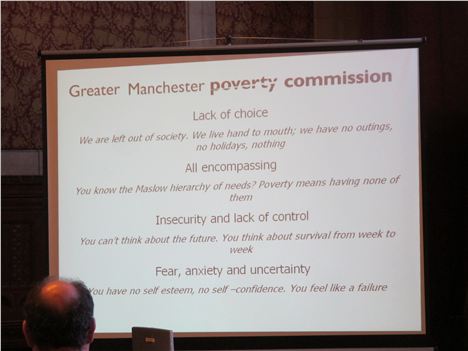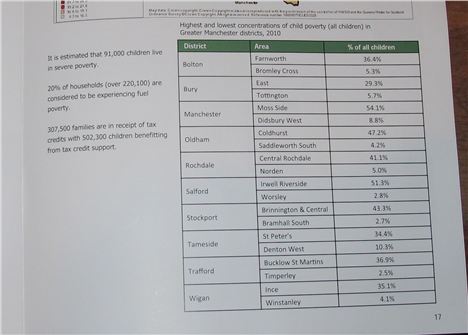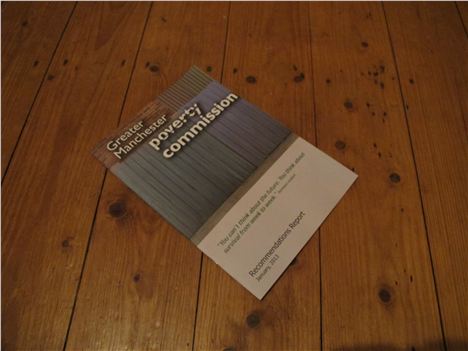The Commission was made up various agencies around the region including the Greater Manchester Centre for Voluntary Organisation, Church Action on Poverty and The Diocese of Manchester.
It's research partner was Centre for Local Economic Strategies.
Confidential will be interviewing the chief executive of the latter body, Neil McInroy, in the coming days to get a more profound insight in to what are extremely disturbing findings.
Key Findings:
- Over one in five residents live in the 10% most deprived areas nationally.
- Almost 270,000 residents are workless with incomes dependent on state benefits.
- An estimated 137,000 residents are in work but earn less than a Living Wage.
- It is estimated that 91,000 children live in severe poverty.
- 20% of households (over 220,100) are considered to be experiencing fuel poverty.
- 307,500 families are in receipt of tax credits with 502,300 children benefiting from tax credit support.
The Commission was led by The Bishop of Manchester, The Right Reverend Nigel McCulloch (pictured above), who revealed the terrible toll of food, fuel and financial poverty across almost 600,000 out of Greater Manchester's 2.6m people.
The findings mean that it's not only the unemployed and infirm who find themselves trapped in poverty but people with jobs, sometimes more than one job, as well.
With the politicians, both local and national, the bishop says, he wants the report, its compilers, and the broader population to be an "irritant, a stone in the shoe, reminding the politicians of their responsibilities".
"Any society which forgets to care for the poor is a poor society," said the Bishop.
In order to improve the situation for tens of thousands across the region the report recommended the following.
The recommendations
1. Promote initiatives designed to reduce energy bills across Greater Manchester.
2. Increase access to affordable finance and financial support services to improve financial literacy.
3. Create a coordinated and sustainable approach to tackling food poverty.
4. Increase access to affordable fresh fruit and vegetables.
5. Explore ways of providing transport for residents in poverty.
6. Reduce digital exclusion by providing subsidised broadband and increasing provision of free ICT literacy learning.
7. Review the supply and demand of free legal advice services in Greater Manchester.
8. Improve the availability of quality childcare provision across the sub-region.
9. All public services in Greater Manchester should be 'poverty proofed'.
10. Improve the planning and coordination of voluntary sector service to tackle poverty.
11. Develop a Greater Manchester Living Wage campaign.
12. Build upon and maximise the Greater Manchester City Deal to increase the benefits disadvantaged communities experience from economic growth.
13. Ensure all strategies within the sub-region designed to promote growth also have realistic plans for addressing poverty.
14. The Greater Manchester Combined Authority should take forward the work of the Greater Manchester Poverty Commission by establishing a Poverty Action Group.
15. Develop a neighbourhood level Greater Manchester Poverty Index.
16. Join forces with the Fairness Commissions in Liverpool, York Newcastle and London to campaign and lobby on common issues.













